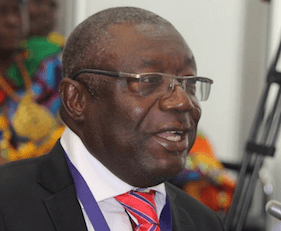Ghana government launches $103.4m World Bank funded project to restore degraded landscapes, sanitize mining sector

The Ghana Landscape Restoration and Small-Scale Mining Project (GLRSSP) has been launched by the government to strengthen the integration of the country’s natural resource management.
The World Bank approved $103.4 million in August last year to implement the project expected to benefit 250,000 youth, farmers, artisanal small-scale miners and women.
Dr Kwaku Afriyie, the Minister of Environment, Science, Technology and Innovation, on Tuesday, virtually launched the Project.
The Project is being implemented by the Ministry of Lands and Natural Resources, the Ministry of Environment, Science, Technology and Innovation and coordinated by the Environmental Protection Agency.
Dr Afriyie said the project aimed at strengthening the integration of the country’s natural resources management and increasing the benefits to communities in targeted savannah and cocoa forest landscapes.
It would also support sustainable land use, water, and forest management initiatives in climate-vulnerable target landscapes and support the formalization of small-scale mining.
The project would geographically target two landscapes, the Northern Savannah Zone, including the Guinea Savannah ecological zone, the Sudan Savannah ecological zone, and the upper portions of the Transitional ecological zone; and the cocoa forest landscape, including parts of the Forest ecological zone and the Pra River Basin.
The financing of the project includes an International Development Association (IDA) credit of $75 million and $28.4 million in grants from the Global Environmental Facility (GEF), the Extractive Global Programmatic Support (EGPS) and the Global Partnership for Sustainable and Resilient Landscapes Multi-Donor Trust Fund.
The liberalization of Ghana’s mining laws in 1989 legalized artisanal and small-scale mining with the fundamental goal of creating jobs and generating revenue.
However, the small-scale mining sector had created an array of challenges, including unsustainable and illegal use of lands for mining, destroying the country’s lands, leading to deforestation, loss of biodiversity, accelerated soil erosion and sedimentation, water and air pollution, and degradation of productive agricultural lands, including cocoa farms, among other environmental damage.
These challenges have cost the nation over $6.3 billion annually, according to the World Bank’s Country Environmental Analysis (CEA) study conducted in 2017.
Dr Afriyie noted that if the natural resource extraction techniques and agricultural methods were not modified and landscape restored, the base of the country’s rich natural resources would be destroyed without thoroughly exploring its benefits and render sustainable economic growth from the sector.
“Our current generation has a moral obligation to restore and sustainably manage the environment for the next generation.
“We may have wasted time, being selfish to an extent, but we can turn things around and strive to achieve a better, greener and healthier environment,” Dr Afriyie stressed.
Mr Samuel Abu Jinapor, the Minister of Lands and Natural Resources, in an address, said the project would help boost post COVID-19 economic recovery, create jobs and secure many livelihoods in the deprived communities by promoting agricultural productivity, ecosystems management and ensuring a well-regulated artisanal small-scale mining sector.
The project interventions, he said, would reduce gender disparities and empower women and girls economically.
Mr Pierre Frank Laporte, the World Bank’s Country Director, in an address, said the project would capitalize on land-use planning for integrated landscape management to optimize land use, formalize artisanal and small-scale mining for sustainable mining, restore degraded lands, promote sustainable agricultural practices, and strengthen sustainable management of forest landscapes for biodiversity conservation and ecosystem services.
The project, he said, would help develop healthy ecosystems that could play an essential role in mitigation, adaptation, and resilience to climate change.
That, he said, would positively affect the cocoa industry and increase its impact on the country’s GDP.
“The project will help boost post-COVID-19 economic recovery, create jobs and secure livelihoods in some of the poorest parts of Ghana by focusing on agricultural productivity, ecosystems management and sustainable small-scale mining,” Mr Laporte said.
Ghana’s ASM sector has grown significantly over the last several years. Its?contribution?to job creation?and the economy makes it one of the nation’s most important sectors, employing about a million people and supporting approximately 4.5 million households.
Source: GNA
